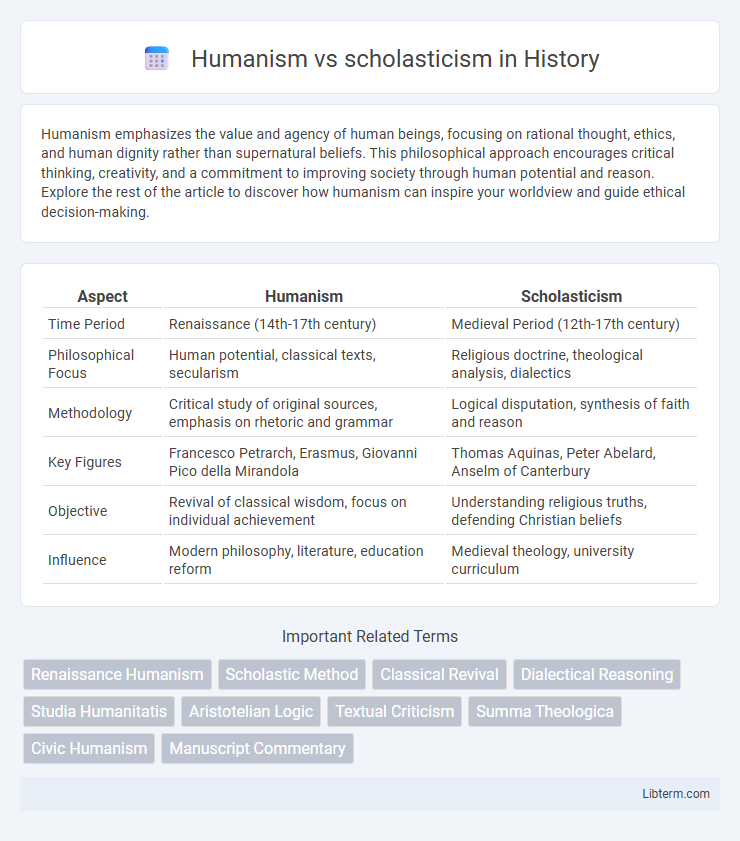Humanism emphasizes the value and agency of human beings, focusing on rational thought, ethics, and human dignity rather than supernatural beliefs. This philosophical approach encourages critical thinking, creativity, and a commitment to improving society through human potential and reason. Explore the rest of the article to discover how humanism can inspire your worldview and guide ethical decision-making.
Table of Comparison
| Aspect | Humanism | Scholasticism |
|---|---|---|
| Time Period | Renaissance (14th-17th century) | Medieval Period (12th-17th century) |
| Philosophical Focus | Human potential, classical texts, secularism | Religious doctrine, theological analysis, dialectics |
| Methodology | Critical study of original sources, emphasis on rhetoric and grammar | Logical disputation, synthesis of faith and reason |
| Key Figures | Francesco Petrarch, Erasmus, Giovanni Pico della Mirandola | Thomas Aquinas, Peter Abelard, Anselm of Canterbury |
| Objective | Revival of classical wisdom, focus on individual achievement | Understanding religious truths, defending Christian beliefs |
| Influence | Modern philosophy, literature, education reform | Medieval theology, university curriculum |
Introduction to Humanism and Scholasticism
Humanism emerged during the Renaissance as an intellectual movement emphasizing the study of classical texts, individual potential, and critical thinking, contrasting with Scholasticism's dominant medieval framework that focused on reconciling Christian theology with Aristotelian philosophy through rigorous dialectical reasoning. Humanism embraced the humanities--grammar, rhetoric, history, poetry, and ethics--promoting a return to original sources and human-centered subjects, while Scholasticism prioritized systematic theology and logical analysis within university curricula. The rise of Humanism challenged Scholasticism's methodological approach by advocating for empirical evidence and human experience over abstract theorizing.
Historical Origins of Humanism
Humanism originated during the Italian Renaissance in the 14th century as a revival of classical learning emphasizing human potential and secular subjects, contrasting sharply with the scholasticism rooted in medieval universities that stressed theological and Aristotelian frameworks. Pioneered by figures such as Petrarch and Erasmus, humanism sought to reform education by focusing on humanities--literature, history, and moral philosophy--based on classical texts instead of solely religious doctrine. This intellectual movement challenged scholasticism's dominance, promoting critical thinking and empirical inquiry that laid the groundwork for modern human sciences.
The Development of Scholastic Thought
Scholastic thought developed through the systematic application of Aristotelian logic and dialectical reasoning to theology and philosophy during the Middle Ages. Medieval scholars like Thomas Aquinas synthesized Christian doctrine with classical knowledge, creating a comprehensive intellectual framework that emphasized metaphysics and natural theology. This method dominated medieval universities by prioritizing rigorous argumentation and the reconciliation of faith with reason.
Core Principles of Humanism
Humanism emphasizes the study of classical texts, individual potential, and the value of human experience, prioritizing critical thinking and secular subjects over religious dogma. It advocates for education aimed at developing well-rounded individuals through rhetoric, grammar, poetry, history, and moral philosophy, known as the studia humanitatis. This approach contrasts with scholasticism's focus on dialectical reasoning and theological analysis rooted in medieval scholastic traditions.
Fundamental Tenets of Scholasticism
Scholasticism is grounded in the synthesis of Christian theology with Aristotelian philosophy, emphasizing dialectical reasoning to resolve contradictions and establish dogmatic truths. Its fundamental tenets include the use of rigorous logic, reliance on authoritative texts such as the Bible and works of Church Fathers, and the structured method of disputation to explore theological and philosophical questions. This framework contrasts with Humanism, which prioritizes classical texts, individual critical thinking, and the study of human nature and moral philosophy outside strict doctrinal confines.
Humanism’s Impact on Education and Culture
Humanism profoundly reshaped education and culture during the Renaissance by emphasizing the study of classical texts, critical thinking, and the development of individual potential. It encouraged the use of vernacular languages, making education more accessible and fostering a cultural revival in literature, arts, and philosophy. The movement's focus on human values and empirical observation challenged the rigid scholastic methods tied to medieval universities, leading to more dynamic teaching practices and cultural expression.
Scholasticism’s Role in Medieval Universities
Scholasticism formed the intellectual foundation of medieval universities, emphasizing rigorous dialectical reasoning to reconcile Christian theology with classical philosophy, particularly Aristotle's works. It structured the curriculum around disputations and commentary, fostering critical analysis within theology, law, and medicine, essential for academic discourse and credentialing. This methodical approach enabled universities to systematize knowledge, shaping Western education by promoting scholastic inquiry as the dominant framework until the rise of humanism.
Key Figures in Humanism and Scholasticism
Desiderius Erasmus and Thomas More emerged as central figures in Humanism, emphasizing the revival of classical learning and critical thinking during the Renaissance. In contrast, Scholasticism was dominated by figures like Thomas Aquinas and Albertus Magnus, who focused on reconciling Christian theology with Aristotelian philosophy through systematic reasoning. These key thinkers shaped their respective intellectual traditions by influencing education, theology, and the philosophical discourse of medieval and early modern Europe.
Humanism vs Scholasticism: Philosophical Differences
Humanism emphasizes individual potential, critical thinking, and a return to classical sources to understand human nature, contrasting with Scholasticism's focus on reconciling Christian theology with Aristotelian philosophy through dialectical reasoning. Humanists prioritize empirical observation and secular topics, while Scholastics rely on rigid logical frameworks and authority-based interpretations. This philosophical divergence highlights Humanism's advocacy for intellectual freedom and moral philosophy against Scholasticism's systematic and dogmatic approach.
Lasting Influence on Modern Thought
Humanism's emphasis on individual potential and critical inquiry laid the foundation for modern educational philosophies and secular human rights, promoting a shift from medieval scholasticism's rigid, theology-centered framework. Scholasticism's systematic approach to knowledge and logic influenced the development of scientific methodology, shaping disciplines such as philosophy, theology, and law. The interplay between humanism's revival of classical texts and scholasticism's analytical rigor contributed to the Renaissance and Enlightenment, fostering a lasting impact on contemporary intellectual discourse and academic institutions.
Humanism Infographic

 libterm.com
libterm.com